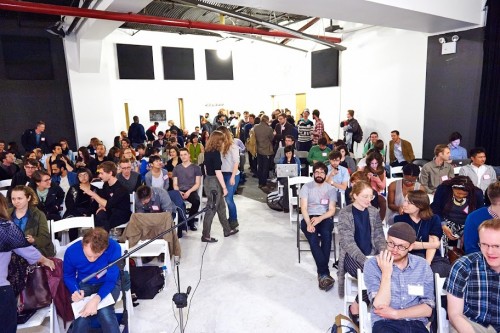
For last year’s iteration of Theorizing the Web, we took a new step in our development as a conference and produced an anti-harassment statement.
We felt it was important, for a number of reasons. It’s not a matter of feeling; it is important. It seems like – fortunately – this is an issue to which more and more conferences and conventions are paying attention. There’s more in the way of an ongoing discussion than there once was. There’s a growing recognition that these kinds of stands need to be taken and these kinds of explicit guidelines need to be established in order to make spaces safe for all attendees – or at least to try to make those spaces as safe as possible.
Because here’s the thing: these kinds of policies/statements are always going to be works in progress. They’re never going to be finished. They’re going to be subject to the forces and pressures of real-world application, and as such they’re going to be tossed into situations for which they were written but for which they frequently weren’t specifically designed. There are always things you don’t anticipate. Especially if you’re coming from a place of privilege, which – among other things – stunts the growth of the imagination. It just does. It hurts one’s ability to prepare.
So last year we had an anti-harassment statement. We put it online before the conference and tried to call people’s attention to it. We solicited and gratefully listened to a number of extraordinarily helpful comments and criticisms. We needed that help. We couldn’t do that alone.
We still need that help, because we still can’t do this alone.
Last year the statement was tested. I’m not going to go into the details now, but I invite you to read that post so you have some sense of what the process was like. This year it might very well be tested again. So we want to make sure it’s as clear and strong a statement as it can possibly be.
anti-harassment statement
In light of recent public conversations spurred by incidents at other conferences, and in the spirit of being both proactive and inclusive, it is important that we communicate the Organizing Committee’s commitment to providing a harassment-free space for participants of all races, gender and trans statuses, sexual orientations, physical abilities, physical appearances, body sizes, and beliefs. Harassment includes, but is not limited to: deliberate intimidation; stalking; unwanted photography or recording; sustained disruption of talks or other events; inappropriate physical contact; and unwelcome sexual attention. We ask you, as participants, to be mindful of how you interact with others—and to remember that harassment isn’t about what you intend, but about how your words or actions are received.
In keeping with a central theme of Theorizing the Web, we also want to remind you that what is said online is just as “real” as what is said verbally.
By attending Theorizing the Web, you agree to maintain and support our conference as a harassment-free space. If you feel that someone has harassed you or otherwise treated you inappropriately, or you feel you have witnessed inappropriate or harassing behavior, please alert any member of the Organizing Committee (identifiable by our badges; you can also find photos of all Committee members on our “Participants” page). If an attendee engages in harassing behavior, the conference organizers may take any lawful action we deem appropriate, including but not limited to warning the offender or asking the offender to leave the conference. We welcome your feedback, and we thank you for working with us to make this a safe, enjoyable, and welcoming experience for everyone who participates.
If you have any comments, concerns, any suggestions for ways in which we can make this thing better, please get in touch with us here or in the comments below.
We’re going to do all we can to make this year’s Theorizing the Web a safe space for everyone. Thanks so much.

Comments 1
#TtW15’s Anti-Harassment Statement and You - Treat Them Better — March 31, 2015
[…] #TtW15’s Anti-Harassment Statement and You […]